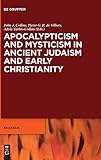Apocalypticism and Mysticism in Ancient Judaism and Early Christianity / ed. by Adela Yarbro Collins, John J. Collins, Pieter G. R. Villiers.
Material type: TextSeries: Ekstasis: Religious Experience from Antiquity to the Middle Ages ; 7Publisher: Berlin ; Boston : De Gruyter, [2018]Copyright date: ©2018Description: 1 online resource (V, 219 p.)Content type:
TextSeries: Ekstasis: Religious Experience from Antiquity to the Middle Ages ; 7Publisher: Berlin ; Boston : De Gruyter, [2018]Copyright date: ©2018Description: 1 online resource (V, 219 p.)Content type: - 9783110591835
- 9783110596922
- 9783110597264
- 220.046 23/ger
- online - DeGruyter
- Issued also in print.
| Item type | Current library | Call number | URL | Status | Notes | Barcode | |
|---|---|---|---|---|---|---|---|
 eBook
eBook
|
Biblioteca "Angelicum" Pont. Univ. S.Tommaso d'Aquino Nuvola online | online - DeGruyter (Browse shelf(Opens below)) | Online access | Not for loan (Accesso limitato) | Accesso per gli utenti autorizzati / Access for authorized users | (dgr)9783110597264 |
Frontmatter -- Contents -- Introduction -- Apocalypses and Mystical Texts: Investigating Prolegomena and the State of Affairs -- Is There Mysticism in the Dead Sea Scrolls? -- Paul, Jewish Mysticism, and Spirit Possession -- “Mystical” Traditions in an Apocalyptic Text? The Throne Vision of Revelation 4 within the Context of Enochic and Merkavah Texts -- Ascent and Inspiration in the Writings of Philo Judaeus -- Dancing with the Stars: The Ascent of the Mind in Philo of Alexandria -- Journeys towards Fullness of Life: A Comparison between Philo and the Apocalypse of John -- Bibliography -- Index
restricted access online access with authorization star
http://purl.org/coar/access_right/c_16ec
The nature and origin of Jewish mysticism is a controversial subject.This volume explores the subject by examining both the Hebrew and Aramaic tradition (Dead Sea Scrolls, 1 Enoch) and the Greek philosophical tradition (Philo) and also examines the Christian transformation of Jewish mysticism in Paul and Revelation. It provides for a nuanced treatment that differentiates different strands of thought that may be considered mystical. The Hebrew tradition is mythical in nature and concerned with various ways of being in the presence of God. The Greek tradition allows for a greater degree of unification and participation in the divine. The New Testament texts are generally closer to the Greek tradition, although Greek philosophy would have a huge effect on later Christian mysticism.The book is intended for scholars and advanced students of ancient Judaism and early Christianity.
Issued also in print.
Mode of access: Internet via World Wide Web.
In English.
Description based on online resource; title from PDF title page (publisher's Web site, viewed 28. Feb 2023)


